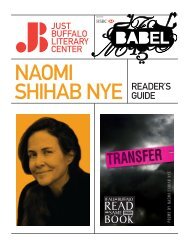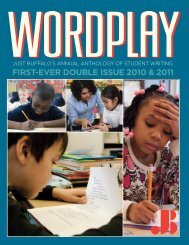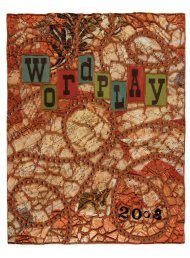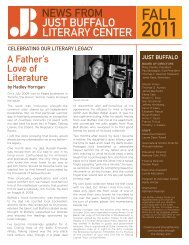Kiran Desai - Just Buffalo Literary Center
Kiran Desai - Just Buffalo Literary Center
Kiran Desai - Just Buffalo Literary Center
You also want an ePaper? Increase the reach of your titles
YUMPU automatically turns print PDFs into web optimized ePapers that Google loves.
<strong>Kiran</strong> <strong>Desai</strong> grew up in an India where books were precious, and because they<br />
brought the world, were read intensely. She was born in September 1971 and<br />
raised in a New Delhi apartment with her mother, the noted writer Anita <strong>Desai</strong>,<br />
her businessman father, Ashvin, and three older siblings. Her mother’s mother<br />
was German and her maternal grandfather was an exile from what is now Bangladesh.<br />
Her father’s family was from the northwest Indian state of Gujarat; in one<br />
of many echoes between <strong>Desai</strong>’s book and life, her paternal grandfather left for<br />
an education in England and returned as a civil service judge.<br />
More echoes: <strong>Desai</strong>’s family had a house in Kalimpong named Chomioma after a<br />
mountain in Tibet (Cho Oyu is also a Tibetan peak), and <strong>Desai</strong> briefly attended<br />
a convent school in the Himalayan foothills. Her aunt, a doctor, still lives in<br />
Kalimpong in a mansion last owned by a blind English woman, <strong>Desai</strong> has said,<br />
who “died completely eaten by maggots in her big brass bed, abandoned by her<br />
servants.”<br />
At 15, <strong>Desai</strong> left India with her mother when Anita was invited to teach literature<br />
first in England, then at Mount Holyoke College and the Massachusetts Institute<br />
of Technology. “We went through that whole odd immigrant thing together,”<br />
<strong>Desai</strong> has said. “She had to learn how to drive, learn how to get a phone; I had to<br />
go to high school, she had to go and teach.”<br />
<strong>Desai</strong> went to high school in Amherst, Massachusetts, then went to Bennington<br />
College in Vermont. She intended to be a scientist, until she took a creative<br />
writing class as a diversion, and found it a revelation. In part, it allowed her to<br />
recognize an identity she’d been missing since she left New Delhi. “When I first<br />
went away, I was far from any Indian context,” she has said. With immigration,<br />
“suddenly all your references are gone, your language is gone. Even the English<br />
you speak is formal and curbed.”<br />
She went to a writing program at Hollins College in Virginia and began her first<br />
novel, Hullabaloo in the Guava Orchard, about a shiftless middle-class man who<br />
climbs up into a guava tree and is mistaken for a guru. She got a master’s degree<br />
at Columbia University, but took two years off to finish her first book. Hullabaloo<br />
2<br />
was well received by critics in the West, but Indian critics chastised her for pandering<br />
to Western readers with a lighthearted book that features drunken monkeys<br />
and monsoons.<br />
<strong>Desai</strong> took the next seven years to write The Inheritance of Loss, which explores<br />
the most serious of topics: immigration, repressive systems of class and government,<br />
violent insurgency, isolation and identity. She has called it, though, “just<br />
a family story.” “There was this realization that what my generation was going<br />
through in America was the same as what my grandparents had gone through in<br />
the UK decades earlier,” she has said. “Nothing had changed.”<br />
She ranged the world while writing it, composing some of it at her mother’s<br />
home in Cold Spring, New York, other parts in a borrowed house in Kalimpong,<br />
and others on long trips to Mexico with her mother. When it was published in<br />
2006, it won the Man Booker Prize (an honor three of her mother’s books had<br />
been nominated to but never won). At 35, she was the youngest woman ever to<br />
win the prize. But she doesn’t think her age makes her more or less remarkable.<br />
“I know a writing career goes up, goes down to its own rhythm — some are<br />
welcomed books, others despised books, but that’s the public side. The important<br />
thing is the journey of thought, of experimentation. I feel very much at the<br />
beginning of that process.”<br />
3
India Focus:<br />
Nepalese in india<br />
Immigration touches each of the characters in The Inheritance of Loss and often<br />
becomes a question of belonging. The judge, educated in England about English<br />
laws, returns to India only three years before the country’s independence from<br />
Britain in 1947. He feels like a foreigner in England and at home. Noni and Lola<br />
cling to Western culture in a house named Mon Ami (French for “my friend”)<br />
and locate the “quintessence” of England in their British-made underwear. Father<br />
Booty, a Swiss missionary priest, is deported from India after living there for more<br />
than two decades because he neglected to renew his papers. Sai’s parents move to<br />
Russia. Biju is an undocumented worker in America. The Nepalese people, who<br />
made up 95 percent of the population around Kalimpong and Darjeeling in the<br />
mid-1980s when the novel is set, are legally considered foreigners even though<br />
they are Indian-born.<br />
INDIA<br />
WEST BENGAL<br />
The thread of the Napalese people’s belonging shapes the present-day setting of<br />
the novel (the year 1986), when the Gorkha National Liberation Front’s strikes<br />
and protests led to violence. Although the GNLF was formed as a political party<br />
in 1980, its demands for an independent Gorkhaland state (separate from West<br />
Bengal, but still part of India) peaked between 1986 and 1988. During those<br />
years, more than 200 people were killed in fighting.<br />
The Nepalese population in West Bengal began to grow in the middle of the<br />
19th century under British rule. Gorkhas (a term for Nepalese people) became an<br />
integral part of the area’s tea economy and crucial members of the Indian army.<br />
A 1950 treaty between Nepal and India allowed for a porous border between<br />
the two countries, and enabled citizens from each country to live and work in<br />
the other. It also meant that people of Nepalese descent living in India were<br />
not officially considered Indian citizens. Although Gorkhas were promised an<br />
autonomous state and recognition of their language by West Bengal’s Marxist<br />
government several times after 1950, they were never given that autonomy.<br />
In 1986, states neighboring West Bengal, forced “foreigners” including Indianborn<br />
Nepalese to leave because of ethnic tensions. When the evicted Napelese<br />
tried to move to West Bengal, they were sent instead back “home” to Nepal.<br />
The GNLF seized the moment to push for an autonomous state, which would<br />
recognize them as Indian citizens and guarantee they would never be dispossessed<br />
of their lands. The movement involved demonstrations and general strikes,<br />
including clashes with police that left several dead. In July 2006, 15 people,<br />
including women and children, were killed after police opened fire at a banned<br />
rally (a moment recreated in The Inheritance of Loss).<br />
Violence also erupted in tea gardens, where more than 80,000 Nepalese worked.<br />
British press reports at the time noted workers on both sides fought with khukris<br />
(traditional Gorkha knives), spears, lathis (bamboo poles) and iron rods. The<br />
Nepalese worker’s strikes caused tea garden owners to lose millions of dollars but,<br />
in a response that resonates in <strong>Desai</strong>’s novel, the GNLF leader said the solution<br />
was simple: “If the planters want peace, they’d better support the campaign for<br />
Gorkhaland,” he said. “Otherwise their interests will be harmed.”<br />
In 1988, the GNLF and the West Bengal government agreed to create an<br />
autonomous hill district, though not an autonomous state. They created<br />
the Darjeeling Gorkha Hill Council, which controlled the area’s economic<br />
development programs, education, and culture.<br />
4 5
QUESTIONS<br />
1. Describe the physical state of Cho Oyu. Compare it (a house named after<br />
one of Nepal’s highest mountains) to Mon Ami (a house named after the French<br />
words for “my friend”). Who lives/ has lived in each house What does its state<br />
say about its occupants What does it imply about the larger condition of the<br />
country<br />
2. Who takes Mutt and why<br />
3. How does Sai and Gyan’s relationship begin and end It is often described in<br />
chapters that precede or follow descriptions of the judge’s marriage. How do the<br />
two relationships compare<br />
4. Why are the Napalese in Kalimpong fighting What do they stand to gain<br />
What is the cost of the insurgency<br />
5. Describe some of the journeys people take in the novel—the judge to England,<br />
Father Booty to India, Biju to America, Sai’s parents to Moscow and then<br />
outerspace. What are the limits of travel Does anyone’s journey work out well<br />
What do the travelers hope to find Why, at the end of the book, does Sai resolve<br />
to leave<br />
kitchens Do unlikely alliances also take place Does class or race play a more<br />
important role in determining who works where and in what position<br />
9. <strong>Desai</strong> writes that “a great amount of warring, betraying, bartering had occurred”<br />
over the geographical region where the novel is set “despite the mist<br />
charging down like a dragon, dissolving, undoing, making ridiculous the drawing<br />
of borders.” Where else in the book does the environment seem to ignore or<br />
overcome efforts to define and control the region What point does this theme<br />
reinforce<br />
10. The novel opens with Sai reading an article about giant squid—creatures<br />
with a “solitude so profound they might never encounter another of their tribe.”<br />
What tone does this set for the rest of the book Who has a similar solitude<br />
11. We are told Biju brings the “habit of hate” to America, but nearly all the<br />
novel’s characters exhibit a similar hate and prejudice at sometime. Describe the<br />
emotional and physical violence in the novel. What does it have to do with an<br />
inheritance of loss<br />
6. In England, the judge “found he began to be mistaken for something he<br />
wasn’t—a man of dignity. This accidental poise became more important than<br />
any other thing.” How does the judge’s accidental dignity shape the rest of his<br />
life Who else uses an idea of dignity to define themselves and their relationship<br />
to others<br />
7. Compare the difference between the rich and poor in America and the rich<br />
and poor in Kalimpong.<br />
8. Biju finds there is “a whole world in the basement kitchens of New York.”<br />
How do the animosities between nations play out between immigrants in those<br />
6<br />
7
JUST BUFFALO PRESENTS:<br />
Works by <strong>Kiran</strong> <strong>Desai</strong><br />
Hullabaloo in the Guava Orchard (Anchor, 1999)<br />
Additional Resources<br />
Barton, Laura. “A Passage from India.” The Guardian. 12 Oct. 2006. http://books.<br />
guardian.co.uk/manbooker2006/story/0,,1920237,00.html<br />
“Exclusive Interview with <strong>Kiran</strong> <strong>Desai</strong>.”<br />
http://www.themanbookerprize.com/perspective/qanda/40<br />
“What Does it Mean to be an Immigrant” Rediff. 30 Jan. 2006.<br />
http://in.rediff.com/news/2006/jan/30inter1.htm<br />
“Critical Mass: <strong>Kiran</strong> <strong>Desai</strong> Q&A.”<br />
http://bookcriticscircle.blogspot.com/2006/10/kiran-desai-q.html<br />
Major funding for Babel Provided by:<br />
Kulman, Linda. “Book Tour: <strong>Kiran</strong> <strong>Desai</strong> Reads The Inheritance of Loss.”<br />
http://www.npr.org/templates/story/story.phpstoryId=10662383<br />
Lyall, Sarah. “A Cross-Cultural Saga Wins the Booker Prize.” The New York Times.<br />
11 Oct. 2006.<br />
Pilkington, Ed. “Saturday: Interview: A Hullabaloo.” The Guardian. 16 Sept. 2006.<br />
Smith, Dinitia. “A Writer Looks to her History and Reaps an Award.” The New York<br />
Times. 26 Oct. 2006.<br />
BABEL is sponsored by:<br />
8<br />
<strong>Just</strong> <strong>Buffalo</strong> <strong>Literary</strong> <strong>Center</strong><br />
Market Arcade<br />
617 Main St. Suite 202A<br />
<strong>Buffalo</strong>, NY 14203<br />
Ticket Information and Purchases:<br />
Phone: 716.832.5400<br />
Fax: 716.270.0184<br />
www.justbuffalo.org/babel








